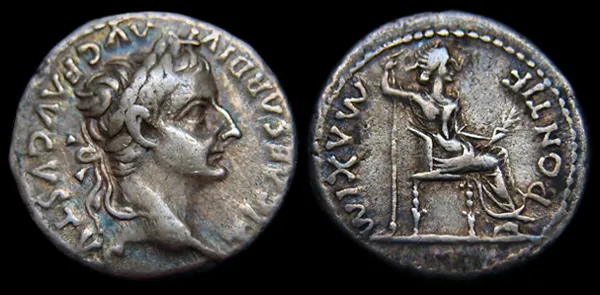Render unto Caesar
written by Rocco Stanzione and shared with permission

When they heard this, they were amazed. So they left him and went away.
This is the end of a passage most people know only as "render unto Caesar". So why were the Pharisees amazed? Because they'd asked Jesus whether to pay taxes and he'd said yes? Not exactly. They'd just gotten owned. Let's walk through Matthew 22:15-22...
Then the Pharisees went out and laid plans to trap him in his words. [15]
This is what's known as "context". It's the beginning of the story. And a clever plan it was, as we'll soon see.
They sent their disciples to him along with the Herodians. [16]
Why the Herodians? The plan involved asking Jesus a question to which there could not possibly be a right answer. The answer they hoped he'd give would result in his immediate arrest and the end of his mission. Game over, Pharisees win. They came prepared.
'Teacher,' they said, 'we know that you are a man of integrity and that you teach the way of God in accordance with the truth. You aren’t swayed by others, because you pay no attention to who they are. Tell us then, what is your opinion? Is it right to pay the imperial tax to Caesar or not?' [16-17]
Nasty. We know you're an honest guy and always speak the truth, so maybe you can resolve this apparent contradiction for us: if the person of a man is immaterial, how is Caesar due tribute just for being Caesar? Is taxation legitimate? What a trap. If he says yes, pay your taxes, he contradicts and discredits himself in front of witnesses, and his mission is over. If he says no, don't pay your taxes, he's arrested and the end result is the same. Worse, answering the question at all would constitute a claim to rabbinical authority he could not, on paper so to speak, back up, and of course refusing to answer would be the worst move of all. He was basically doomed.
But Jesus, knowing their evil intent, said, 'You hypocrites, why are you trying to trap me?' [18]
He opens by making it clear to everyone present that he knows what they're up to. This is about to become important.
'Show me the coin used for paying the tax.' They brought him a denarius... [19]

This bears close examination. As we know from this context, plus the inscription we're about to hear about, plus a little history, it was struck at Caesar's private mint specifically for the purpose of paying soldiers, and it was the only coin that could be used to pay taxes. Very few people ran around with these things in their pockets, because they were hard to come by and you'd better have them come tax time. Only people with easy access to them, which were people very close to the state, carried them around and used them in commerce. They said in no uncertain terms, "do you know who I am?" Bystanders, as if they didn't already know, bore witness in these few seconds to the corruption of the Pharisees.
...and he asked them, 'Whose image is this? And whose inscription?' 'Caesar’s,' they replied. [19-21]
It may not have gone as smoothly if he'd asked them to read the inscription, which might have made them uncomfortable: "Ti[berivs] Caesar Divi Avg[vsti] F[ilivs] Avgvstvs" ("Caesar Augustus Tiberius, son of the God Augustus")
So he asked whose it was, but in the eyes of those present - in the temple district - the damage was done. It was, the Pharisees confirmed, an idolatrous coin with a graven image of a man claiming to be a god. Just as bad, the reverse of the coin identified Caesar as the high priest of the goddess Pax. Not friendly to the Pharisees. Jesus seizes the tactical advantage, but he does much more.
He has also, in the space of a few seconds, solved the problem of answering a halakhic question without a well established claim to the authority to do so. In the tradition of formal rhetoric in first-century rabbinical literature, when an outsider poses a hostile question (as Jesus identified it in his opening) to a well-educated rabbi, he will respond with a question of his own, the answer to which he knows and which will render his opponent's malevolent question vulnerable to attack when answered.
Further, his counter-question invoked the terms "image" and "inscription" and thereby three central provisions in the Torah: the first and second commandments and the Shema. The commandments prohibit the worship of anything but God and the crafting of any false image for adoration, both of which are violated by the coin carried and presented by the Pharisees.
The Shema is an important Jewish prayer in the same spirit (exclusive worship of God) which also requires observant Jews to literally or figuratively (on their hearts, for example) "inscribe" it in conspicuous places.
That is, he responded as a well-trained rabbi would have, and successfully so.
Then he said to them, 'So give back to Caesar what is Caesar’s, and to God what is God’s.' [21]
This is just dripping with insinuation. "How about you give these idolatrous coins back to your benefactor in Rome who made them instead of carrying around to intimidate people, and give God his due." What, by the way, is God's, and what is left after that to be Caesar's? This is the killing blow. He has not only escaped the trap, he's sent his interrogators scurrying away defeated. He's solidified his authority in the eyes of all witnesses. He's presented an argument against taxation, without leaving himself vulnerable to arrest. He's discredited the Pharisees, or rather tricked them into doing it for him. We now understand why:
When they heard this, they were amazed. So they left him and went away. [22]

The pre-HIVE post archive can be found here. We also invite you to visit BadQuaker.com and our Facebook group, and, as always, thank you for reading.